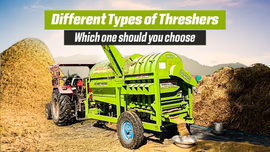The Ultimate Guide to Implement Loans: Benefits, Eligibility, and How to Apply

Agricultural industry is one of the major industries in India that requires a constant cash flow to keep it running. It can be for land, seeds, storage, tractors, and implements. While tractors are the backbone of farming, implements are crucial too. Agricultural implements are necessary for tractors to unlock their full potential in farming. In India, the cost of implements ranges widely from thousands to lakhs. Some of the implements are too expensive, which are difficult to afford. In such cases, a farmer can opt for an implement loan. This blog explores everything about implement loans, including its benefits, eligibility criteria, documentation requirements, and all other factors.
Table of Contents
- What is an Implement Loan?
- What are the Eligibility Factors for an Implement Loan?
- What are the Documents Required for an Implement Loan?
- What are the Features and Benefits of an Implement Loan?
What is an Implement Loan?
Implement loans are the agricultural financing provided to aid farmers in buying farming implements of their choice such as rotavators, cultivators, super seeders, and many more. The loan amount and interest rate are issued on the basis of applicant’s down payment, CIBIL score, and loan duration. The low interest rates can be accessible to you with bigger down payment, shorter loan tenure, and a higher credit score.
What are the Eligibility Factors for an Implement Loan?
The eligibility criteria for every institution vary depending on their policies. However, while getting a farm implement loan from lenders like TVS Credit, the eligibility factors are as follows:
- Registration Certificate (RC): The applicant must own a tractor on his/her name with a valid tractor’s Registration Certificate (RC). In case, you are yet to get your tractor’s RC, the tractor’s Invoice will also work if the purchase is within 90 days. Providing the RC is mandatory because the implement loans are unsecured loans. Therefore, checking the credibility of the farmer becomes necessary for the assurance of recovery.
- CIBIL Score: The CIBIL or credit score must be 700+. The applicant is also eligible for the implement loan in case the applicant has not taken any loan ever in the past.
- Tractor’s HP Compatibility: The type of implements and tractor’s HP are also important. The implements compatible with your tractor’s HP are eligible for the implement loan. Tractorkarvan provides all the information to help you choose the most suitable implement for your tractor.
- Annual Income: The applicant should have a minimum income of 1.2 lakhs per annum to become eligible for the farm implement loan.
- Certified Brands: Tractorkarvan provides detailed information regarding Farm implement loans on 65+ certified brands including all the top brands like Mahindra, Fieldking, Lemken, Shaktiman, John Deere, Swaraj, New Holland, etc.
- Implement Type: We also give you information on farm implement loans on 22 types of implements such as rotavator, trolley, plough, thresher, straw reaper, etc. To take an implement loan, the chosen implement should be one of the 22 implement types.
- Down Payment: 25% of the total loan amount is required to be paid as a down payment of the farm implement.
What are the Documents Required for an Implement Loan?
The following documents are mandatory for initiating and completing the implement loan process:
- A quotation from the supplier or manufacturer of the implement you want to purchase.
- Government-issued identification documents like Voter ID card, Passport, Driver's License, PAN card, or Aadhaar card are required to verify your identity.
- Proof of your current residential address is required. It can be a copy of a ration card, electricity bill, or passport.
- A Registration Certificate (RC) to verify the tractor's ownership.
What are the Features and Benefits of an Implement Loan?
Getting the farm implement loan is quite easier with lenders such as TVS Credit. Once you have chosen your farm implement and provided the required documents, the loan gets approved and sanctioned without any delay. Some of the assured benefits are mentioned below:
- Farmers can preserve their capital for other operational expenses or investments by spreading the cost of acquiring implements over time.
- Complete doorstep assistance in KYC of your documents is provided if required. The entire process of verification is done at your home without you going anywhere.
- Loans can be customized based on your land holdings and you can avail the loan tenure of up to 72 months.
- The journey of your farm implement loan can be completely digital and paperless based on your requirements.
- The loan amount is sanctioned within 24 hours and disbursed within 48 hours with no hidden charges.
- The applicant can easily repay the loan based on crop cycle and harvesting patterns.
Conclusively, the implement loan can ease the accessibility to best agricultural equipment for any farmer in need. Farmers can preserve their capital for other operational expenses or investments by dividing the cost of acquiring implements over time. Implement loan can technologically upgrade your tractor and enhance its productivity which will result in more profit.


Related Blogs












